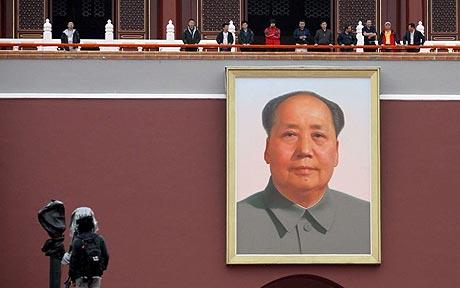Striking Similarities Between Czechs & Chinese

In the Czech Republic (CR), there'll be no fete-ing the Chinese (CN) milestone, just the usual slew of student-led protests outside the gates of the PRC Embassy in Prague. Czechs, in general, are no fans of the surging People's Republic of CN, with the tradition of passive resistance firmly entrenched in the minds of these folks since the end of the aptly-named "Velvet" Revolution, whose anniversary Czechs will be celebrating in a month and a half's time. The latter was that latest of "Czech last stands" against autocratic power, a regime they are well-familiar with. In 1989, they applied the padded boot to the posterior of their former Communist majordomos. This, they claim, was a revolution.
Alas, we're getting ahead of ourselves here...
Since it's human nature to self-absorb about one's local environment, in that spirit I got to thinking this Prague morning during my commute into town about the striking similarities between Czechs and Chinese.
Here are my not-so-random observations about how I compare these two great surviving peoples:
- Both have sordid histories of national humiliation, especially during the past century: Let's count: over the past 400 or so years the Czechs have been occupied and shamed by a number of formidable foes starting with the Czech defeat at the hands of the Combined Catholic Armies of Europe during 1620's Battle of White Mountain. Later, there was the formidable spanking by the imperial armies of the Austro-Hungarian Habsburg Dynasty during the Revolution of 1848. There was the Nazi Protectorate, the Soviet Invasion during the Prague Spring, and even -- yes -- a recent fear that the modern "Czech Republic" be occupied yet again, this time by the US Army. Note: as part of these endless occupations and reoccupations, the Czech language has often been relegated to second-fiddle -- or lower -- status in its own birthplace, often beneath German. In CN, in comparison, Chinese humiliation began with the series of "unequal treaties" which came into force at the end of the First Opium War as part of 1842's Treaty of Nanjing following the Qing Empire's defeat at the hands of the British Crown. More ignomines followed the putting-down of the Boxer Rebellion, 1919's May Fourth Movement (after Japan was unfairly granted China's Shandong Pennisula at the end of WWI by the victorious Great Powers). It got worse with the advent of Japan's Manchukuo Colony, 1937's Rape of Nanjing, the Sino-Japanese Wars, the Warlord Era, and ended in the culmination of the Chinese Civil War, that definitive and resounding national tragedy which ultimately lead to the foundation of today's People's Republic of China (PRC).
- Linguistic nationalism: (CR) Spend any amount of time in the Czech capital as a visitor or businessperson, and you're likely to realize your ability to function as a non-Czech speaker in Prague is severely curtailed. This applies doubly so for trips outside the Golden City -- most Czech towns possess a minority of capable speakers of foreign tongues (not including Romany). Indeed, there are exceptions: in border burgs like Plzen, Usti nad Labem, or Ostrava, some German is spoken; completely natural given the frontier context of these places. In the Czech Republic, all DVDs and television programs are dubbed into Czech (except for cinema pictures). English, German, or French magazines are not widely sold in the country, only via specialty distributors or by internet subscription. Czechs outside of Prague's tourist areas are reluctant to engage with foreign language speakers in assisting them with directions or obsequious banter, for instance, and this has resulted in some unwelcome feedback from some of the people I've spoken to. All of this exists due to the strong educational tendency in Czech schools towards dissauding the use of English (or other foreign tongues) in the classroom and the poor availability of good teachers -- even at the university level, which logically explains the overall poor grades Czech 18-34s receive in the language department. Plenty of expats who have taken note of this upon arrival, and the reams of blogposts and comments at Czech international community sites like Prague.tv and Expats.cz relate the sorry tale in all its gory detail. (CN) It's almost humourous to compare China to the CR, given the gross disproportionate numbers (though some Czechs behave as though they have the clout of a China), but Chinese are quite similar. Language is a prominent barrier to Western penetration of the Middle Kingdom, though for entirely different reasons. Travel outside of the major towns like Shenzhen, Guangzhou, Shanghai, or Beijing, and you'll likely be resorting to subtle hand and/or eye gestures in order to communicate your most basic ideas to the locals. As part of the contradiction which is today's modern practice of Communism with Chinese Characteristics (or "Chinese-style capitalism"), China's leaders trumpet the supremacy of the national Putonghua -- Mandarin Chinese -- the officially-sanctioned dialect of Chinese, while young Chinese students and corporate employees have fallen obsessively in love with English (and only English!). English (pirated) DVDs are subtitled in Chinese, not dubbed as they are in the Teutonic and German-influenced worlds (egs. Poland, Czech Republic, Slovakia, Germany, Austria). Banned English language books are sought after and pirated with as much of a collector's zeal as one-time Beatles X-ray records were traded in the Former USSR. Chinese youngsters in China's big cities are gaga about meeting foreigners, in cultivating friendships with these various waiguoren ("far away people") and transient expats, and in learning as much as they can from them and their ways in as short a period of time as possible. Their ambitions to succeed and strive is fast becoming legendary in this 21st-century. Colloquial English lessons and Japanese-style English grammar drills are exploding in popularity, with most Chinese parents urging their mostly lone children to become proficient in the language -- the international language of business -- as part of their preparation for the Chinese Gao Kao.
- Cultural speaking norms: Similar to Asians who have a tendency to speak indirectly through hints, allusions, and suggestions -- rarely declaring something for what it is -- Czechs have also developed a keen ability to avoid confrontational conversations and being bold. In CN, this finds its roots in more imperial, Confucian times, where speaking directly to a superior implied disrespect, and calling attention to oneself through direct speech brought unwanted scrutiny. When mistakes were made at work, for instance -- especially during the horrors of China's Cultural Revolution of 1966-1976 -- speaking up meant that you were in some way responsible for the error, and by calling attention to it through precise description one would often invite catastrophe upon oneself and one's family. Czechs, as a rule, are rather timid and unassuming. They are not a people built for ironclad verbal commitments and ebullient enthusiasms, an understandable outgrowth of their recent national history. This is also how children are raised in the Czech Republic -- in comparison to the rest of Western Europe -- which only serves to reinforce this negative habit amongst the Czech Republic's future talents. While this has changed considerably since the fall of the Berlin Wall, there is much work left to be done in this country in teaching the locals how to "grow a pair."
- Internet properties custom-designed for their local populations: (CR) While Facebook, YouTube, Twitter, Skype, and Google are proven online darlings in the rest of the developed world, the CR's surfing behaviour continues to astoundingly favour chatting via the Czech version of ICQ (ICQ?!), its popular Seznam.cz ("directory") search engine (much to the chagrin of the local flavour of Google), and community sites like Lide.cz (which means "people") instead of LinkedIn or Facebook (though this is changing). In CN, the Great Firewall of China prevents access to the above-mentioned sites, while China has QQ.com -- its own ICQ or Skype -- Tudou.com & Yukou.com -- its own YouTube -- Sina.com (it's own Google) -- and Fanfou.com, its own Twitter.
- Their economies are firmly pegged to exports and foreign nations: While China's leaders have -- since the advent of the global credit crunch -- been begging the nation to boost domestic consumption by "buying local" and to somehow reduce Chinese industry's dependence upon US exports, there is still work to be done in this regard (though CN will make lightning-quick headway as soon as all parties get up to speed). The CR, in contrast, remains the EU's consummate transporation and logistics hub, given its near-ideal location in the middle of the European phallus (save for Italy, doesn't it look a male member?), boasting strong auto exports with the TPCA joint venture and Hyundai plants, and is a net energy exporter through the corrupt practices of state-owned CEZ. Still, the CR must rely on outside forces to make up its budget deficits, regardless of what the nation's embarrassing juvenille politicians will otherwise tell you.
- Both are innovation centres: The Czech lands have a vaunted history of innovation, especially in the modern era. Few people know that the soft contact lens was created in the Former Czechoslovakia (RIP) by Professor Otto Wichterle among literally hundreds of other obscure technical innovations. Today's Czech Republic is also remains a robust technical statelet -- what we resident foreigners humourously call "being Czechnical" -- and the nation spins out a high proportion of engineers, scientists, and technicians for its compact size despite the inexorable lure of "doing byznes" amongst today's young set or the desire to press into service high-level crooked Czech parliamentary contacts in order to achieve windfalls and corporate privileges unavailable to the average Czech citizen. Young Czechs just aren't as in interested in science as they are in having stuff or gallivanting off to world-dominating metropolii in Turkey, the Greek Islands, Slovakia, Croatia, Germany, Austria, Spain's Balearic Islands, France, and the UK (read: as close to home -- and in the case of most Czech men I've met, Mama -- as possible), though Czech innovation will eventually recover as the nation recants its present profligate consumer ways, mimicking the habits of its present "big brother," Uncle Sam. As for CN, the world's third-largest economy is the planet's greentech and cleantech innovation leader -- even though it becomes increasingly blacker as it greens out. And there are now more strident calls for cleverer marketing, promotion, and branding efforts on the part of its tech industry titans like Huawei, Haier, and Lenovo. What is indeed certain about China (like the Czech Republic) can be summarized by the following piece of apt advice a China-based CEO recently told me:
"Everything is difficult, but everything is possible."
Throughout the course of this monumental sixty years of PRC statehood, I'll be revisiting the subject of Czech-Chinese similarities as we go along.
A final thought: Tomas Garrigue Masaryk would often claim to confidants like the journalist-writer Karel Capek -- who with brother Josef coined the term "robot" -- that it would take fifty years for the Czechs to learn how to act like sovereign people in their own land. "Communist" China has already made it to sixty. Just imagine the year 2039 in a multicultural, multiethnic, multilingual democratic Prague...
Sweet, don't you think?

 Vytápění plynovým kotlem se stále vyplatí, i když plyn zdraží
Vytápění plynovým kotlem se stále vyplatí, i když plyn zdraží Šmuclerová je ze hry. O post ředitele ČT si to rozdají její dlouholetí manažeři
Šmuclerová je ze hry. O post ředitele ČT si to rozdají její dlouholetí manažeři První Čechoslovák, který se vylodil v Normandii, byl Miloš Knorr
První Čechoslovák, který se vylodil v Normandii, byl Miloš Knorr Milujete svou zem, nebo jste nacionalisti?
Milujete svou zem, nebo jste nacionalisti? Co je to vlastně láska
Co je to vlastně láska

